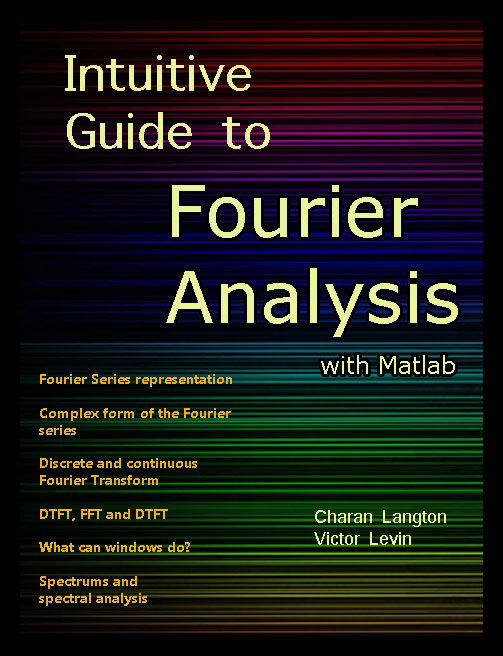Intuitive Guide to Fourier Analysis by Charan Langton and Victor Levin
I am working on a book with the imaginative and creative title of “Intuitive Guide to Fourier Analysis”. This is an old topic, but forever confounding in all its myriad forms.
The book will have some of my DFT, FFT material, plus Matlab code. It will also have chapters on spectral estimation which is ultimately the reason why we do the FFTs.
The DTFT we all know and love is mathematically valid only for deterministic signals. Real life signals are random, even when they have some deterministic components, such as a carrier. Per Dirichlet, we can not just take the DTFT of a random signal. That is a no-no. What we need to do is to take the auto-correlation first and then the DTFT of the Auto-Correlation Function (ACF). There are the issues of windowing and the length of the ACF. Then we have parametric and non-parametric estimation methods. Spectral estimation is a complex topic and there is little agreement on how to do it right. There are numerous complexities in understanding what the hardware is producing, how to best match it in simulation, and, most importantly, if the results are valid. I got carried away writing my last chapter on spectral estimation and even then never got to the parametric estimation which is a whole another world of mathematics, used mostly for describing finance, environmental, and biological phenomena.
I am working on this book with my son Victor as a co-author. He had just completed his masters in EE at Georgia Tech and is looking for a job in wireless or embedded systems. If anyone is looking for a smart young engineer, here is a link to his page.
Charan Langton

Mam, I am a big fan of your writing on all the technical topic related to telecommunication, can you please write something on beamforming moreover adaptive beamforming
Charan,
Thanks so much for this website and your extremely lucid explanations! I wish that I had access to this information while I was attending university. I have especially appreciated your writeups on the Fourier transform. You have taken a difficult subject and presented in a way that is easy to understand. I was wondering when your book, “Intuitive Guide to Fourier Analysis” will be published as I (and I’m sure many others) would like to obtain a copy.
Best Regards
Thank you John for your nice comments.
If you are willing to read my chapters as I am doing them, I would be most grateful.
Please let me know.
Thanks again,
Charan Langton
Charan,
I’m sorry to not get back to you sooner. I got busy with work and life, had not visited your website in a while and had erroneously thought that it would auto-send email if comments are posted.
To answer your original question — yes, I would consider it an honor to read the chapters as you are writing them. I cannot claim to be any sort of expert here, but if having another set of eyes going over the manuscript would be helpful, I gladly offer myself to your efforts.
Best Regards,
John
hi,Charan,
I am a Chinese student major in Electronic Technology. Firstly I want to express my gratitude for you effort to write a good book–Intuitive Guide to Fourier Analysis, I had read two chapters,and also I think I had found some little clerical mistakes in the book,I attempt to contact you in the Facebook,but got none response,could you give me a email, I will sent you about them.
And I want to know that what software you used to draw the picture like e^jwt ?
Thanks a lot again! You are a good teacher for me.